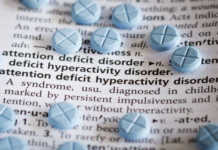A study published in the journal Pediatrics reveals large differences from one pediatrician to the next when it comes to diagnosing and prescribing drugs for ‘ADHD.’ The researchers found that the percentage of children being diagnosed with ‘ADHD’ varied from as high as 16% of patients at some offices to as little as 1% of patients at others. The data also revealed significant but lower variability in the pediatric diagnosis of anxiety and depression.

The researchers, led by first author Stephanie Mayne from the Children’s Hospital of Philadelphia, reviewed the health care records of almost 300-thousand children across 43 different primary care practices in the US. They compared the records to assess differences in diagnosis and psychiatric prescribing across the different practices.
They found that, overall, 15% (40,932) of children seeing general practitioners received a mental health diagnosis, and that 14% of all children received a prescription for a psychiatric drug. The most common diagnosis was for ‘ADHD,’ which varied substantially from between 1% to 16% from practice to practice. There was also a significant variance in the percentage of children that each practice was prescribing psychiatric drugs, with some offices prescribing them to over a quarter of their patients (26%).
“The prevalence of mental health diagnosis and psychotropic medication prescribing varies substantially across practices and is only partially explained by psychiatrist availability,” the researchers conclude.
“Research is needed to better define the causes of variable practice-level diagnosis and prescribing and implications for child mental health outcomes.”
****
Mayne, S.L., Ross, M.E., Song, L., McCarn, B., Steffes, J., Liu, W., Margolis, B., Azuine, R., Gotlieb, E., Grundmeier, R.W. and Leslie, L.K., 2016. Variations in Mental Health Diagnosis and Prescribing Across Pediatric Primary Care Practices. Pediatrics, p.e20152974. (Abstract)















No surprises here. When you have a totally subjective set of criteria for a supposed “disease” and huge financial and professional incentives for prescribing, you’re going to get a pretty big range of variation, based on both the lack of objective standards and the bell curve of variance in peoples’ integrity/corruptibility levels.
—- Steve
Report comment
I call ADD, A Daddy”s Drama. I don’t know who came up with the criteria for ADHD but why don’t they diagnose by finding the cause of the issues instead of label and drug? I wouldn’t give my child these drugs without trying every alternative first! As a children’s advocate can you give suggestions such as allergy testing, diet, restricting stimulating activities etc?
Report comment
The biggest cause is sending them to a standard school classroom. “ADHD” is basically a description of “a child who won’t be able to tolerate a standard classroom environment.”
Look at the criteria – they have to do with blurting out answers, being unwilling to wait one’s turn, failing to persist on tedious tasks – sounds a lot like “doesn’t cooperate with the teacher’s agenda.” We homeschooled or used child-focused alternative schools (even helped to create one!) and our kids thrived without any kind of medication or even any attempt by others to convince us there was something wrong with them.
The other issue is discipline. These kid have a hard time thinking ahead, and they need to learn about the consequences of acting without thought, hopefully without getting severely injured. But punishment approaches don’t seem to work well at all with them (generally don’t work great with most kids, but they seem to be particularly damaging for these kids). So we spent a lot of time making it FUN to go along with the program and BORING to act up or break the rules (and let’s be honest, the one thing these kids have in common is that they HATE being bored!)
We did try to make sure they got enough sleep and ate well – less sugar seemed to help, but sleep helped a lot more. Of course, they also hated any kind of schedule, so we had to be creative there. Setting up rituals around bedtime and being willing to spend a couple of hours getting them to sleep seemed to be the important points.
There are also nutritional conditions, like allergies, heavy metal poisoning, low iron, that can contribute. Also issues with “sensory integration” can be part of the problem, and addressing these can make things a lot easier. And of course, trauma or family conflict can create or make worse this kind of behavioral issue, so that really needs to be looked at in any case, no matter how “normal” the family seems from the outside.
That’s just a short list. I could write a book! There are tons and tons of things that can be done, including just accepting that your kids are like that and not trying to make them be too different from their natural temperaments, while helping them learn some skills for situations where some restraint is required rather than doing the first thing that comes to mind. But it takes all kinds to make a world, and while these kids will never like sitting still and doing as they are told, they’re fun, funny, creative, often athletic, and can be incredibly committed to justice and fairness or other goals or values they consider important.
Hope that’s at least a partial answer to your question. The real bottom line is that all kids are different and have their own challenges, and it’s up to the adults to help them figure out how to succeed, even if the adults find their behavior inconvenient or annoying. It’s not the kids’ job to follow our agendas – it’s our job to help them find a way to execute theirs.
— Steve
Report comment
Maybe we need a ‘common core’ diagnostic system so each child is treated fairly in the doctors office and none are left behind.
Surely there are some really ‘smart’ people in Washington who can figure this out and set up a bureaucracy to make it happen.
We can have all kinds of mandatory forms to make sure it’s done and computer diagnostic tools in every doctors office all connected to a central database.
It will create jobs too, computers don’t program themselves and that paperwork all needs filing creating even more jobs at office max, paper mills , the people who make the bleach to make that paper too. Truck drivers delivering more paper and those children working in China will get more hours and rising income to making pens and computer parts.
Report comment
Its highly subjective. At the age of about 38 I suddenly started having short term memory problems and executive function problems (I didn’t know what this was at the time). At that point I was a biology student with a 3.8 GPA. It quickly became so bad that I was failing every class and couldn’t even read my daughter’s picture books. I had a psycho-social test and my executive functions mimic someone with severe ADHD. No matter how much I try to tell them that I am the exact opposite of hyper and I need my thoughts to go faster, not slow down, they insist that I have ADHD. I’ve also tried showing them proof that I was not having any trouble prior to this but they insist I had ADHD all along but just didn’t notice it. Adderall does help, though, but that’s because it acts like a stimulant for me.
Report comment
Ysbeth,
This question may sound strange but by any chance, could you have sleep apnea? Many people wrongly diagnosed as ADHD turn out to have it.
Another reason I am asking is you mentioned having cognitive problems which is quite common with sleep apnea. Of course, there could be several other reasons why you are having trouble and I am wondering if you were given any other possibilities besides ADHD?
No matter what, your situation sounds so frustrating and I wish all the luck in the world in getting it resolved.
Report comment
I “have” the ADHD for sure like a poster boy for it.
What was I just going to write ?
Adderal works, that awesome high is so calming and focusing. I feel like a rat snitch not going along with the “if you ave ADHD it doesn’t get you high” thing. 30mg and game on.
I just feel bad for the kids cause when it wears off, that can’t eat anxiety bummer crash is no fun at all. Thats why I don’t use it anymore, I hate the ending.
I got a Ritalin script once that stuff feels like cocaine cause its like a ‘stupider’ stimulant.
Report comment
What ? This was supposed to be a new post not a reply.
Report comment
I like the “might” in the title.
Report comment
And on the subject…If this piece [link below] in the popular ‘Daily Beast’ site wasn’t underwritten by pharma it should have been! Author doesn’t have the curiosity – on any level – to question anything about the issue – on any level – and the doc pushing it is doing so for the very reason I always suspected people all stuff drugs down their kids’ gullets: their own convenience. No thought to long-term effects or any of the other hundred issues…
http://www.thedailybeast.com/articles/2016/05/28/kiddie-adderall-could-actually-be-a-lifesaver-for-parents-and-children.html
Report comment
All the DSM stigmatizations depend on your doctor, since none of the DSM disorders have any scientific validity, nor any way to test for them, they’re all just matters of opinion by doctors. And their “lack of validity” and reliability, no doubt, is directly related to the “integrity/corruptibility levels” of the individual doctors.
Report comment